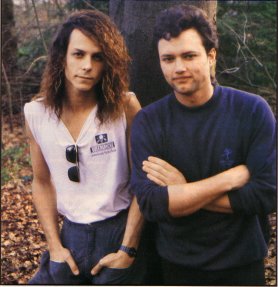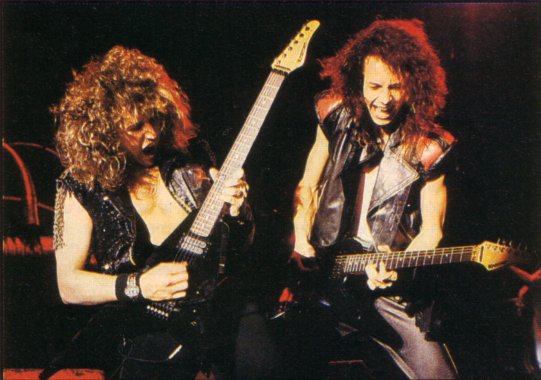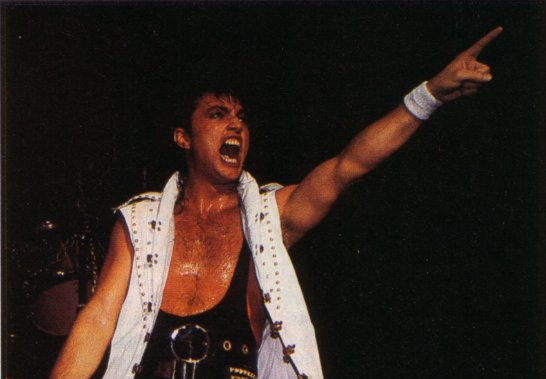

|
Metal Hammer |
We haven't heard a peep from the boys for the last year - and by now we've grown accustomed to bands hiding themselves away in the middle of nowhere before they return, amidst a fanfare of publicity, with a new album. The last we heard from Queensryche was when Geoff 'Woody Woodpecker Haircut' Tate twice joined Bon Jovi as support on tour - and that was sometime back in 1986. But it's not as if the band have been lying low and lying on beaches or whatever bands do in their spare time. No siree, not these boys. They've split from their management company and have been taken on by the heavyweights of management, Peter Mensch and Cliff Burnstein - the two of them being responsible for the likes of Def Leppard, Metallica, Tesla, Dokken... get the picture? Since then they've holed themselves up in a studio to work on 'Operation Mindcrime'. Queensryche finished the final mix at the Wisseloord studios in Holland bang on the stroke of midnite on February the 25th. Vocalist Geoff Tate and guitarist Chris De Garmo then flew on to Cologne where Oliver Klemm backed them into a corner and fired questions at them.

'Operation Mindcrime' is one of these albums where you know you're onto a good thing the minute you hear it - doesn't happen much, but when it does you'd better watch ! Okay, so it may sound like a clichee, but this sucker really is so close to perfection it's astounding. The songs have been written as if the guys had a manual in their hands as they wrote, they play as if Hendrix, Page, Blackmore and Moon were coaching them as they recorded and as for Geoff Tate's vocals... Plant, Dio and Bruce Dickinson had better watch their asses. The production is pretty smart too, in fact producer Peter Collins is such a perfectionist that he's managed to stick together an album that is almost as good in terms of production as Rush's last album 'Hold Your Fire'. Queensryche know a good thing when they see it, or should that be hear it? After all Peter Collins was responsible for the excellent production on Oueensryche's second album, 'Rage For Order'. But the band came close to having to use Neil Kernon (RFO) as their producer. "The deadline for starting work on the album was creeping closer and closer and Neil still hadn't finished working on the Dokken album. We really had to get our shit together and find another producer as quickly as possible. Our management came up with Peter and there we are." It's not surprising that Peter's name cropped up as Cliff Bernstein is credited as being the guy who discovered Rush and made Peter the house producer... oh sorry Geoff... did I interrupt you? "We knew immediately that he was the right guy for the job. There's no doubt that 'Operation Mindcrime' is Queensryche's biggest project so far and we spent a long time in pre-production and planning. We met Peter a couple of times, swapped ideas and quickly decided that he was the right guy."
Oueensryche were obviously well suited to a producer, like Peter Collins, as they are similar to Rush in their approach to complicated arrangements and orchestration - and Geoff agrees: "Yeah, he enjoyed working with us as we're all workaholics and perfectionists and so is he. If he's gonna work with a band he would want musicians who are capable of giving their best, and Rush are a perfect example of that. They're superb musicians who are capable of changing their style all the time and discovering new areas. Peter wanted to put across a kind of street-wise, street orientated aggressive sound. The album covers a whole stack of different approaches. We've got fast thrashy numbers to grooving songs right up to an eleven minute orchestral piece." 'Operation Mindcrime' is as different to 'Rage For Order' as that album was to 'The Warning'. That's the beauty of Oueensryche - they're always managing to pull something out of the bag and have always got something hidden up their sleeve, if you knoworrimean?! But is there such a thing as a definitive Oueensryche sound? Is there a Oueensryche style of doing things? Surely after 'Rage For Order', the fans who bought the album will expect more of the same or something similar?... but they're not going to get it are they? "Sure, you could look at it that way, but remember there's always another side to the story. Part of our approach is all about being innovative. We're always trying to come up with something new, but we do build up our sound from something that is inherently original. One of our trademarks is that dark, even sombre approach. Our strength lies in being able to be variable and in the end that's what people want from us. That's the way it has been and that's the way it'll stay!"

Chris De Garmo feels the same way about things: "I think that people are more interested in seeing and hearing what a band can come up with as far as that band's particular genre is concerned and not just hear a rehash of the same old stuff. Sure, you want to keep things steered in the same general direction, but the last thing you want is to hear the band continually copying themselves. Our albums do sound the same, but each one is different in some way. As far as this album is concerned we sat down and wrote a complete story. The music and the lyrics describe the story and that again is something that we've never done. When you listen to the album you'll see that it's not just the same old Queensryche, but the same good ole Queensryche. Similar, but different..."
The band started work on the album way back in December '86, whilst they were still on tour. Chris fills us in: "At the time all we had were a few riffs and a few lines of lyrics and when we got back home after the tour in February '87 we really got down to things. We started the pre-production in October. That means that the songwriting alone took eight months. As always we ended up having far more songs than we could use, because 'Operation Mindcrime' is a concept album - a story - it wasn't a case of having twenty songs ready and then picking the best ten for the album. Each track on the album is there for a specific reason. The only question we had was how far we wanted to take the story..." Geoff takes the point further: "... yeah, how far we should take the story without it getting boring. You know, in the past we've been accused of writing vagueish lyrics and you know they may have been right. Our ideas might not have been as concrete as they should have been and that's why we've written the current lyrics from a different standpoint and put them on an understandable level."
THE STORY
Geoff explains what the story and are all about. "There are three main
characters in the story, each one having its own identity and background, just like in a movie.
The main character is a guy who is sick to the max of the way he lives and the way things are
done. He feels manipulated by the government, the media and his surroundings. That's why he
wants to change his life, get more in touch with things and put more meaning to his life. He
gets in touch with a friend of his who's got terrorist tendencies and who tries to change
things through violence and revolution."
"Revolution Calling, the first track on the album after an intro, is a kind of flashback. It's as if the album starts with the end and then works its way to the beginning. The main character takes part in a massive meeting where another one of the characters is giving a speech. He then realises how he has been indoctrinated by all the speeches. The song is all about how he becomes aware of everything about his life." Queensryche have obviously put a lot of effort into getting the music as close to the lyrics as possible, so that the music really compliments the words. "We tried to paint a picture of what was going on and that's a real difficult thing to do. What we were trying to do was to paint an aural picture if you know what I mean. This album is the most difficult thing that we've ever had to do since we started the band. The lyrics were a lot of hard work. I got the idea not from a book I'd read or a film I'd seen, but from myself. I suddenly had the idea for the concept after talking to various people over the years."
"I did a lot of research on the subject. I spent a lot of time talking to real street people. Those guys haven't got a roof over their heads and survive only on state handouts, soup kitchens and so on. I spent a long time with these poor people and got a lot of inspiration from them. The other main character in the story is a nun called Sister Mary. I didn't just limit the story to one idea, but instead covered all sorts of different aspects.
"I covered religion, politics and social wrongs. Put it this way I didn't put any limits on what I wrote about. But I think that I've told you enough. Basically the way you see the story is all up to your own interpretation. There are a lot of hidden surprises and twists and, as always, there's that element of tragedy which has become like a kind of Queensryche trademark."

So where did the song 'Spreading The Disease' come from and what disease specifically are we talking about? Geoff: "A lot of people ask us whether it's about Aids, but it's not. The idea behind it is all about the way people are manipulated by others and the power games between the Super Powers. The mention of the disease is used purely as an analogy. All we're doing is showing how those in power yield that power. A great example is the 'Say No To Drugs' campaign which is supported by Nancy and Ronnie Reagan. Sure everyone is hollering 'Say NO!', but what you have to remember is that behind that campaign there is a huge political machine in operation, with millions of dollars behind it. It's a big vote making machine that in the end does nothing but line the pockets of the rich. They, those in power, are capable and able of convincing people so much that your average guy in the street is all for the war in Nicaragua. The song shows the misery of it all. Don't do it!, but nevertheless things continue and always will."
Even though the overall concept is Geoff's, one of the tracks 'The Mission', was written by Chris: "What happens here is that the main character's plan kicks into action. Operation Mindcrime is let loose. The background to the song is all about psychological warfare, that you can manipulate people psychologically. What we show in this song is the way the different characters change as the operation goes on. Each set of lyrics show the story from a different angle. Sure, they all are a part of each other but separate. It's almost as if you compare it to the different chapters in a book. They are all full of different situations, but all connected. You know, one chapter deals with the development of a character and the next with another, but they all keep turning up and changing." Fascinating, I'm sure, but how do you manage to put all that into lyrics Geoff baby without confusing everybody? "Easy! The minute you listen to it you'll see what's happening. Then you'll start seeing the picture appearing that we've tried to portray. It's not difficult to follow what's happening -come on, we spent ages trying to make it as easy as possible for people. If you're willing to listen to it carefully you'll soon see what it's all about. Not that we've made it so easy that a child could get it, as always we've added a few surprises and hidden messages."
Well, I think that's enough for the moment on lyrics... yawn. Let's take a look at the production side of things and why they took so long to do it. So does it take three months for Queensryche to get it all together and is that time enough for the band to get the maximum and best product? Chris: "Well, that time limit of three months was set and, believe it or not, we work better to deadlines. The tension and stress helps us to concentrate. In spite of it being the most difficult and challenging work we've ever done it also has been the most fun. We managed to stick to every deadline in the production schedule that we had and we're completely happy with the end result. You know, even if we had had more time I don't think that we could have ended up with anything better. It's easy to end up in a kind of Def Leppard situation where everything takes an eternity. Right at the beginning I thought to myself that if we could end up with something like 85% of what we started with then I'd be completely satisfied...we've managed to come up with an album that is 100% of what we wanted and you can't believe how good that feels."